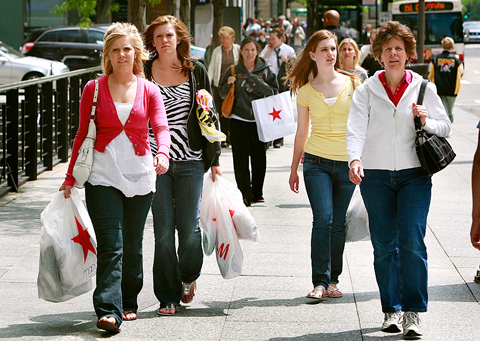The reeling US economy is poised to emerge from recession in the second half of the year, but recovery will be lackluster, a survey of economic forecasters showed yesterday.
The National Association for Business Economics (NABE) said a survey of 45 professional forecasters found that the consensus believed the end of the prolonged recession that began in December 2007 was finally was in sight.
“While the overall tone remains soft, there are emerging signs that the economy is stabilizing,” according to NABE’s latest survey and its president, Chris Varvares.

PHOTO: AFP
“The survey found that business economists look for the recession to end soon, but that the economic recovery is likely to be considerably more moderate than those typically experienced following steep declines,” said Varvares, who is president of Macroeconomic Advisers.
The NABE outlook showed that panelists expected GDP to shrink by 1.8 percent in the second quarter.
But the NABE panel, in the survey taken between April 27 and May 11, downgraded the outlook for the next several quarters.
The panelists said a sharp pullback in business investment was stoking near-term weakness, and cited rising government spending as a “vital support” to the ailing economy.
The consensus forecast continued to see a “modest” rebound in the second half, beginning in the third quarter, “followed by steady improvement,” NABE said.
But overall the lackluster rebound was expected to post a meager 1.2 percent annual pace, “well below trend,” in the second half of the year.
That would include growth of 1 percent in the third quarter and 2.1 percent in the fourth quarter.
For next year, meanwhile, the NABE pegged average growth at just 2 percent, down from its earlier projection of 2.4 percent growth.
NABE said the key downside risks continued to loom large: steep job losses, extremely tight credit conditions and falling home prices.
“These same forces are causing consumers to remain cautious, a feature that NABE panelists think is here to stay,” the association said.
Consumer spending is key to recovery since it represents about two-thirds of US output.
The NABE panel predicted that labor market conditions would deteriorate further, but the pace of job losses would decline through the rest of the year.
“A total of roughly 4.5 million jobs are expected to be lost in 2009, driving the unemployment rate to 9.8 percent by year-end,” NABE said.

MORE VISITORS: The Tourism Administration said that it is seeing positive prospects in its efforts to expand the tourism market in North America and Europe Taiwan has been ranked as the cheapest place in the world to travel to this year, based on a list recommended by NerdWallet. The San Francisco-based personal finance company said that Taiwan topped the list of 16 nations it chose for budget travelers because US tourists do not need visas and travelers can easily have a good meal for less than US$10. A bus ride in Taipei costs just under US$0.50, while subway rides start at US$0.60, the firm said, adding that public transportation in Taiwan is easy to navigate. The firm also called Taiwan a “food lover’s paradise,” citing inexpensive breakfast stalls

TRADE: A mandatory declaration of origin for manufactured goods bound for the US is to take effect on May 7 to block China from exploiting Taiwan’s trade channels All products manufactured in Taiwan and exported to the US must include a signed declaration of origin starting on May 7, the Bureau of Foreign Trade announced yesterday. US President Donald Trump on April 2 imposed a 32 percent tariff on imports from Taiwan, but one week later announced a 90-day pause on its implementation. However, a universal 10 percent tariff was immediately applied to most imports from around the world. On April 12, the Trump administration further exempted computers, smartphones and semiconductors from the new tariffs. In response, President William Lai’s (賴清德) administration has introduced a series of countermeasures to support affected

CROSS-STRAIT: The vast majority of Taiwanese support maintaining the ‘status quo,’ while concern is rising about Beijing’s influence operations More than eight out of 10 Taiwanese reject Beijing’s “one country, two systems” framework for cross-strait relations, according to a survey released by the Mainland Affairs Council (MAC) on Thursday. The MAC’s latest quarterly survey found that 84.4 percent of respondents opposed Beijing’s “one country, two systems” formula for handling cross-strait relations — a figure consistent with past polling. Over the past three years, opposition to the framework has remained high, ranging from a low of 83.6 percent in April 2023 to a peak of 89.6 percent in April last year. In the most recent poll, 82.5 percent also rejected China’s

PLUGGING HOLES: The amendments would bring the legislation in line with systems found in other countries such as Japan and the US, Legislator Chen Kuan-ting said Democratic Progressive Party (DPP) Legislator Chen Kuan-ting (陳冠廷) has proposed amending national security legislation amid a spate of espionage cases. Potential gaps in security vetting procedures for personnel with access to sensitive information prompted him to propose the amendments, which would introduce changes to Article 14 of the Classified National Security Information Protection Act (國家機密保護法), Chen said yesterday. The proposal, which aims to enhance interagency vetting procedures and reduce the risk of classified information leaks, would establish a comprehensive security clearance system in Taiwan, he said. The amendment would require character and loyalty checks for civil servants and intelligence personnel prior to